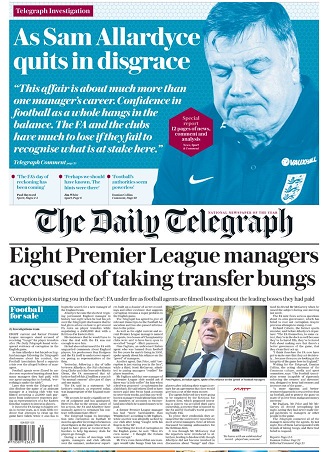The demise of Big Sam – good news for the game?

Clearly the news that Sam Allardyce has ceased to be England manager after just one game ought not to be a matter for rejoice; it is quite embarrassing for the FA and our national game.
Last night’s breaking news – coming a little under 24 hours after the Daily Telegraph’s undercover investigation hit the public domain – is, however, in my view potentially the most positive development within the professional game of football for some time.
That the FA will now be forced to engage with those that have been telling them – for years – that they need to properly investigate and regulate the dubious and dark antics of many participants in the game, can only be a breakthrough moment of some magnitude.
It was only in 2015 that the FA took the view that they were content to deregulate the profession of the Licensed Agent – a profession that was rife with participants who could be described at best as immoral but at worst as corrupt. Rather than take adequate steps to investigate and sanction those Licensed Agents who were so adept at engaging in unlawful activity – and those managers, coaches, chief executives, chairmen, sporting directors, players and family members of players (yes, you read that list correctly!) – the FA were content to simply walk away from any proper regulation and permit – quite literally – anyone with £500 to their name to become a ‘registered intermediary’. The answer was not to abolish the system entirely – the answer was to better improve and properly regulate the one already in place. And to regulate and sanction wrongdoers, including the avaricious, dishonest and corrupt individuals who may well have retained lofty seats in the higher echelons of the professional game.
This is just one example of the many absolute failings of the FA to get a grip on the devastating corruption, immorality and repugnant behaviour of so many individuals that plague our beautiful game.
Many of us in the business will be reading this morning’s Daily Telegraph, reflecting on the three ‘agents’ who talk of eight corrupt managers that they have dealt with. Nothing one reads there is remotely surprising and indeed most agents – or in fact senior officials at most football clubs – could name at least another eight managers/coaches who have engaged in similar activity. Add to that list the naming of many more agents who have encouraged and participated in such conduct (and conduct which perhaps whilst not corrupt does fundamentally destroy the ethics of the game and would offend any right-minded fan) and also those players who themselves knowingly participate in arrangements that are either in breach of FIFA or FA regulations, civil law or actual criminal law – and one would start to develop an impressive roster.
But here is the thing. The FA have been told, time and time again, of the names of all of these people. They know them. They always have. They have been told informally by agents, more formally by representative bodies (such as the Association of Football Agents), by chief executives of football clubs, by journalists. Their response can perhaps be divided into two categories.
The first response was to recognise that a lot of the issues were either instigated by or centrally involved Licensed Agents (as prior to 2015, they were) or, in fact, individuals that were unlawfully acting as Unlicensed Agents (such as Mr Pagliara, named by the Telegraph today). So they deregulated the profession and, in essence, took the view that as it had become a ‘wild west’ industry it was easier to just leave them to themselves. So akin to the police deciding that they are losing the battle against drug crime, so let’s just make drugs legitimate to avoid the problem.
The second response was to always say that they could only act on hard evidence, and that they were not being presented with such. Of course, the reality is often that one has only circumstantial evidence, or hearsay evidence. But the point is this: if the FA are presented with information and evidence, sufficient to create a reasonable suspicion, they had and have the powers to investigate matters themselves. To collect evidence. To interrogate and question. To seek documents, to obtain telephone records. In extreme cases, to go undercover or to engage with informants. Other sporting regulatory bodies do, I assure you.
As a sports lawyer I have had sight of the investigative and regulatory departments of other sporting bodies and these bodies will often react to the most flimsy of evidential cases that are put to them. Indeed, they even encourage anonymous tip-offs (knowing that many tip-offs will derive from jealous rivals with an axe to grind) and use resources to evaluate, investigate and actively seek out wrongdoing. Certainly, where the same name keeps coming up time and time again they will investigate.
This has a self-fulfilling impact: when the nefarious participants of the game start to notice that the governing body are actually investigating, prosecuting and sanctioning wrongdoing (and in appropriate cases involving the police) they start to modify their behaviour (or leave the profession!). Whereas currently the view of most – I am afraid – is that the FA will do nothing anyway, so it is essentially a free for all.
When the FA is seeing the same agent, time and time again, mysteriously acquiring a new player client on the day of a transfer or a new contract (or days before it) when that player has (as the FA’s own records will show them) previously enjoyed a long-term and stable relationship with a former agent, it ought to ring alarm-bells. When that same agent, they know, has been sued time and time again by other agents who have lost players to him, that ought to ring further alarm-bells. When that same agent seems to do an unusual number of transactions at one club that should ring further alarm-bells. When that same agent is also seen to be ‘very close’ to a football manager, the alarm-bells ought to start becoming commissioned investigations. The FA know of these individuals – make no mistake about that. But they will say they have had no hard evidence. Let’s not accept that. Pay anyone with a modicum of investigatory experience for two days and they will bring you back the evidence you need – most of the evidence is actually sitting on the FA systems already. It just needs collating together and the right questions to be asked of the right people. Co-ordinate that with some ex-parte applications for telephone records and things would get interesting!
Of course, the FA have not done any of the above. They staff themselves with people who either do not know, choose not to know or not to act and refuse to take counsel from those who do know and wish to act. I am one of numerous sports lawyers who also acts as an agent who has regularly offered the FA (in my case, on a pro bono basis) advice on how they could immediately root out a large proportion of the corruption and wrong-doing in the game. They are not interested in listening to people like me.
I should be clear: I have no special ability or insight which means I am uniquely placed to advise the FA. Any lawyer who has actually also operated as an agent out in the field will have reached just the same conclusions as I. We are just well placed to understand what goes on between agents, players and clubs but also understand the legalities, regulatory regime, the potential powers of an investigatory body and the Courts and what simple changes need to be made as a result. But as I say, we have no voice.
For that reason, the Daily Telegraph have chosen to do the FA’s job for them and for that we must all be thankful. That it could be the beginning of a new dawn – a dawn that brings about transparency, morality and robust investigation, enforcement and sanction – would be a quite wonderful thing for our beautiful game of football. For us to get from where we are now to that position, a very large number of heads would need to roll. Do not assume they will just be managers and agents – players too will need to be exposed. Family members who have accepted illegal payments in return for encouraging their son or brother or partner to do something they lawfully should not – need to be exposed. The list will be long, and at times painful to digest.
But so be it.


